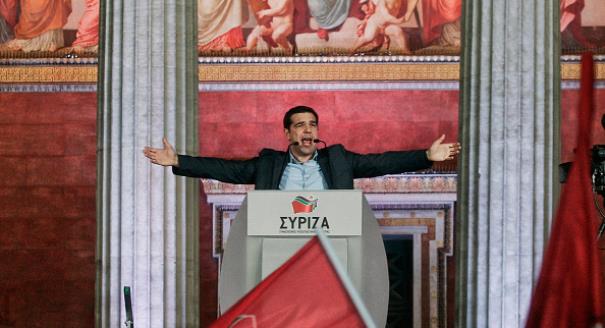So much for a fresh start for Greece’s new government.
The coalition led by Alexis Tsipras’s radical left-wing Syriza party is preparing to reinstate a large number of public-sector employees. Cutting the country’s bloated and inefficient public sector was one of the key demands of the European Commission, the European Central Bank, and the International Monetary Fund in return for providing a €240 billion ($271 billion) bailout.
Tsipras also intends to reverse a cut in the minimum wage and restore collective bargaining agreements that the previous government had abolished to create flexibility in a sclerotic labor market. And some privatization projects, such as selling a 67 percent stake in the strategic Piraeus Port Authority, have been put on hold.
German Chancellor Angela Merkel’s center-right coalition was adamant that Berlin would not support any debt cut. “If Greece wants to deviate from some of these measures, it must bear the cost itself rather than exporting it to other European countries via a haircut or other such ideas,” said German Vice-Chancellor and Economy Minister Sigmar Gabriel.
But if EU leaders are in for tough negotiations with Tsipras over his plans for the Greek economy, they might as well prepare for the worst when it comes to foreign policy.
Never Greece’s greatest strength, to say the least, foreign policy under Syriza is likely to be at odds with EU external action on a broad range of issues.
If Tsipras gets his way over some topics, this will bode very badly for the EU’s foreign policy ambitions. Other radical left-wing and right-wing Euroskeptic parties across Europe could take succor from Tsipras’s approach, which would further weaken attempts by the EU to articulate a coherent foreign policy strategy.
So where does the Greek prime minister stand on EU foreign policy?
Syriza’s views on Russia are well documented. The party has never supported the sanctions the EU imposed on Russia after its meddling in eastern Ukraine. Syriza has already said it would not back another batch of measures, let alone support those already in place that come up for renewal in March.
EU leaders should prepare for the worst when it comes to Greek foreign policy.Tweet This
One of the main reasons for this stance is that leading officials in Syriza have very close contacts with Russian President Vladmir Putin, with Aleksandr Dugin, a Russian nationalist philosopher, and with Russian oligarchs.
This close relationship between Syriza and the Kremlin and its supporters explains why, just before his inauguration as prime minister on January 26, Tsipras first held meetings with the Russian and Chinese ambassadors in Athens.
No wonder both diplomats were in a hurry to congratulate Tsipras. Russia wanted to do so because it seeks disunity in the EU over the sanctions. China had its agenda too: its state-owned Cosco Group was shortlisted for clinching a majority stake in the Piraeus Port Authority.
Previous Greek governments have been pro-Russian and have often refused to toe the EU line. Athens was strongly opposed to sanctions against Serbia during the Yugoslav Wars of the 1990s. But what is different about Syriza and some of its ministers is that they are overtly sympathetic toward Russia—and, in turn, anti-Ukrainian. During a visit to Moscow in May 2014, Tsipras accused the Kiev government of harboring neo-Nazis.
Panos Kammenos, the new defense minister and founder of the right-wing Independent Greeks, who is known for his anti-Semitic views, has blamed Western propaganda for the crisis in Ukraine. “Western NGOs sponsored by Germany or foundations like the Clinton Institute, provoked the crisis in Ukraine where a coup d’état overthrew the legal government,” he said in October 2014.
Russia is not the only foreign policy dossier that will be a source of friction between Brussels and Athens. Don’t expect Greece to change its mind over its refusal to recognize Kosovo as an independent country. Four other EU countries—Cyprus, Romania, Spain, and Slovakia—are holding out as well, fearing that recognition of the breakaway state could be exploited by their own ethnic communities.
As for Macedonia, which has been knocking on NATO’s door for several years, Greece has blocked the country from joining the alliance, even though the former Yugoslav republic had completed all the stages of its Membership Action Plan. That scheme sets countries on the road toward full membership.
Similarly, Greece has blocked the EU from beginning accession negotiations with Macedonia, even though the country has been a candidate for membership since 2005, and the European Commission has recommended that negotiations begin. Talks never started. Greece was prepared to veto them because of the unresolved issue of the country’s name: Athens opposes the use of the name “Macedonia” by the republic without a geographical qualifier.
What is shortsighted about this stance is that anti-EU sentiment and frustration is growing in Macedonia, while the country’s democratization path is far from guaranteed. That surely is not in Greece’s or the region’s interests.
Don't expect #Greece to help restart talks over the status of Cyprus.Tweet This
Don’t expect Greece to help restart talks over the status of the divided island of Cyprus, either. In late 2014, the Greek side cut off negotiations with Turkey and the Turkish Cypriots.
As for the new Greek government’s attitude toward NATO and the United States, it will be interesting to see if and when Tsipras or his defense minister pays a visit to the alliance’s headquarters in Brussels. Syriza’s foreign policy spokesman, Costas Isychos, has already said that NATO has “no reason to exist.”
That must have been music to Russia’s ears—but it must have rung alarm bells among the Greek armed forces, which rely on NATO for their security. Greece’s European and transatlantic partners should brace themselves for tough times ahead.






